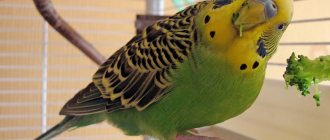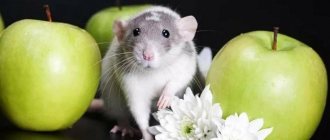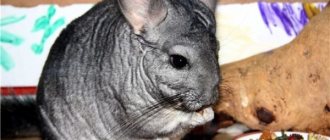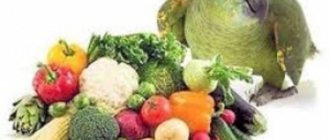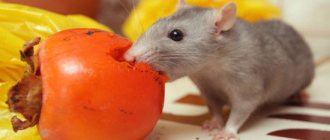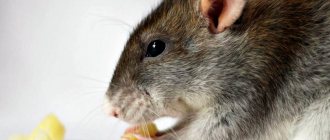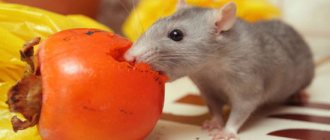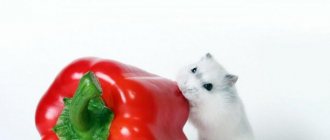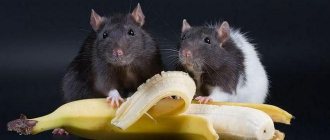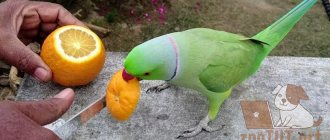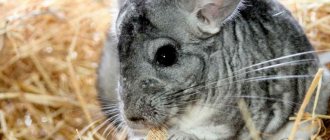When keeping a domestic rat, its diet is very important, which should be varied. Thanks to this diet, the pet will receive all the useful vitamins and microelements, and will also increase its life expectancy. As you know, your pet gets a lot of vitamins from consuming vegetables, fruits and fresh herbs. Therefore, in addition to dry food and animal protein, the diet of a domestic rat should include a variety of vegetables, fruits and herbs. But this omnivore should not be fed these foods indiscriminately. Therefore, the answer to the question can rats eat vegetables is yes, they can, but not all of them. What vegetables can a rat eat, in what quantity and in what form we will look at in our article.
Is it possible to feed a decorative rat cabbage?
People eat cabbage raw or in many dishes, but can pet rats eat cabbage? This vegetable can cause problems for some pets, so are there rats among them? Cabbage is closely related to broccoli, cauliflower, and Brussels sprouts, and its color can range from white to green or purple. It was introduced into culture around 1000 BC. e. in Europe, and today it is pickled, steamed, stewed, boiled, fried or simply eaten raw in salads.
Green food
A caring owner needs to monitor the consumption of greens by a pet rat. List of prohibited green food:
- bugs and horseradish contain substances harmful to animals - essential mustard oils;
- sorrel spinach are a source of oxalic acid, which is dangerous for the pet’s body;
- You can’t feed rhubarb to animals, because it causes disruption of the gastrointestinal tract;
- seaweed has a high iodine content.
Effects on rats
Rats are omnivores and they can eat a wide variety of foods, but some of them can still be harmful to them. The basis of the diet of decorative rats should be specialized grain feeds, since they contain most of the nutrients they need. As a treat, you can add small amounts of fruits or vegetables, and cabbage can be one of them, but the amount should be small.
It has been observed that too much cabbage can cause severe diarrhea in rats, so start with very small portions until you are sure there is no negative reaction. Also, you should not give cabbage every day. Red cabbage has more serious side effects, so only offer white or green cabbage to your rat.
These vegetables contain some sulfur and cause gas in both humans and our pets, which can cause problems for their little tummies. Rats lack a gag reflex. You won't see your rat burping to release some gas, which means that some of the gas-forming foods increase the risk of choking.
Red cabbage and Brussels sprouts contain a substance that causes thiamine (vitamin B1) deficiency in rats, and this can lead to serious health problems, so try to keep these vegetables away from your pet.
Dairy
The decorative rat eats dairy products with pleasure, but some animals have lactose intolerance. Regular milk should not be given to a rodent at all, but fermented milk in small quantities will not harm. However, you should not feed your pet rat sour cream, cheese or cream due to the high fat content of these products.
Animals benefit from cottage cheese, fermented baked milk, yogurt without additives and sugar, yogurt, kefir, acidophilus. All these products should have a fat content of 2-4%. Low-fat foods are less natural. “Sour milk” should be chosen with a short shelf life, preferably children’s milk or from farms.
Nutritional value of cabbage
Cabbage is rich in dietary fiber and is also an excellent source of vitamins C and K. It also contains several B vitamins, small amounts of carbohydrates, sugars and minerals. The most important minerals are calcium, potassium, phosphorus, sodium and magnesium, as well as iron and zinc.
Antioxidants such as choline, beta-carotene, lutein and zeaxanthin are found in higher quantities in red cabbage and they provide anti-inflammatory properties and also stimulate enzyme activity, inhibiting the growth of malignant tumors.
This is excellent for people, as it improves our heart health, immunity, and reduces the risk of cancer. Fiber improves digestion, prevents constipation and removes toxins.
What you can and cannot feed rats
On every resource for rat lovers, along with a general description of the rat’s diet, there is always a topic “dos and don’ts for rats”, in which there is a discussion of products, the effect of which on the health and well-being of rats, rat breeders are not sure. And this is not without reason: many foods can harm rat health. For example, citrus fruits contain a lot of acid, which can damage the mucous membrane of the animal’s stomach and lead to its inflammation (gastritis), legumes and cabbage cause increased gas formation, which can lead to bloating and related problems, etc. As you can see, they are quite ordinary products can lead to very unpleasant consequences. To avoid anything unexpected happening when introducing a new product into a rat’s diet, you can always turn to experienced rat breeders for advice, for example, in the topic “Feeding: dos and don’ts” on the Ratmaniya forum. On this page you can see the experience of many rat breeders, analyzed and collected in one table. I hope the information is useful to you.
For ease of searching, the table is divided into product groups and currently consists of four columns:
“Product Name” refers to the names of the products, which are listed in alphabetical order.
«+/-» - this is the main criterion for whether this product can be given to rats or whether it is better to abstain. There are five categories: dark green (++) - possible without any restrictions, green (+) - possible with reservations, yellow (+/-) - be careful, problems may occur in individual animals, orange (-) - undesirable, because potentially dangerous product, red (—) - product dangerous for rats.
“Comments” - many products, especially dangerous or potentially dangerous, have comments written on them, which you can also rely on in your decision.
“Allergenicity” - there are also allergy sufferers among rats, and highly allergenic foods should first be given only in small quantities, checking the rat’s body’s reaction to them.
Note: theoretically, any product (be it a vegetable, fruit, grain, animal protein or something else) can cause an allergic reaction, so the main rule when introducing a new product into a rat’s diet is to give only a small portion for the first time and monitor the reaction.
List of prohibited products
Prohibited products include the following:
- Alcoholic drinks contain harmful substances that are addictive;
- carbonated drinks cause increased gas formation in the rat’s stomach;
- store-bought crackers and chips are prohibited because they contain a lot of salt and spices, as well as preservatives;
- mushrooms can cause serious poisoning, because difficult to digest;
- Dry and smoked fish are prohibited. They contain a high content of carcinogens and salt;
- rats cannot eat sweets due to the large amount of sugar;
- Caffeine in coffee leads to dehydration and increases blood pressure. Drinking tea is also not advisable;
- flour products contain a large amount of sugar, salt and butter;
- certain types of plants are hazardous to health;
- many house flowers contain toxic substances;
- Pickled, fried, spicy and smoked foods should not be added to the diet. They cause the development of serious diseases, which can subsequently lead to the death of the animal;
- Store-bought corn sticks should not be given as a sweet treat;
- You should not feed your pet rat honey because of the high sugar content;
- freshly squeezed or canned juices have a high concentration of acids;
- branches of trees and shrubs are a source of glycosides and tannins that are dangerous to the rodent’s body. Linden leaves and bark cause a strong choleretic effect;
- the large amount of oil in peanuts can cause stomach upset, leading to increased gas formation;
- Feijoa is highly acidic and contains iodine, so it is prohibited.
The lifespan of a domestic rat depends on the quality of its diet. A caring owner must carefully plan the rodent's menu to avoid health problems. If the owner wants to provide the animal with a long and happy life, he should pay attention to what foods should not be given to rodents.
Can rats eat cabbage?
If you are a pet rat owner, I'm sure you have a lot of questions about what they can and can't do. At the end of the day, you want to make sure you're giving them food that's good for them so they can thrive and be as healthy as possible.
After all, foods that are healthy for us humans aren't always healthy for our pets. To answer this question, I did some research to determine if there was anything in this vegetable that could be harmful to the health of pet rats. Today I will share my findings with you. Let's start!
The short answer is: yes, rats can eat cabbage without any problem. This vegetable contains many essential vitamins and minerals that will benefit your rat. Additionally, since it is very low in calories and fat, there is little risk of overfeeding your rat.
What's in cabbage?
To find out if this vegetable is suitable for rats to eat, let's look at what nutrients cabbage contains.
100 grams of this vegetable contains the following macroelements:
- 28 calories
- 0.4 grams fat
- 5.6 grams carbohydrates
- 2 grams fiber
- 1.3 grams sugar
- 1.9 grams protein
If you look at the nutrition profile above, you will see that kale is very low in calories but contains a decent amount of fiber and protein.
In addition, cabbage contains the following vitamins and minerals:
Vitamin A
If you want to nitpick, kale doesn't actually contain vitamin A. However, it does contain beta-carotene, which rats can convert into vitamin A in their bodies, just like humans. This vegetable is very rich in beta-carotene, which means it provides your rat with a good amount of vitamin A.
Vitamin A is essential for your rat. Research has shown that if rats do not get enough vitamin A, they can become anemic and dehydrated.
Vitamin K
Another vitamin that this vegetable is very rich in is vitamin K. Vitamin K is essential for rodents such as rats and mice because it helps them with blood clotting. If they don't get enough of it, they may develop hemorrhage.
Vitamin C
Most vegetables contain vitamin C, and cabbage is no exception. It contains a good amount of this vitamin. Vitamin C is an antioxidant that helps the rat's immune system and prevents DNA damage. Biological tests have shown that rats can synthesize their own vitamin C in their bodies. However, the dietary vitamin C they get from food is not harmful to them in any way.
Manganese
Manganese is a mineral that cabbage is quite rich in. In rats, manganese helps the brain function properly and is also beneficial for the nervous system.
Other vitamins and minerals
Apart from this, cabbage also contains decent amounts of B vitamins, copper, calcium, potassium, antioxidants, iron and phosphorus.
Overall, this plant is rich in vitamins and minerals, making it a great vegetable to include in your rat's diet.
How to feed cabbage to rats?
Rats can eat this vegetable either cooked or raw. However, one thing you should consider when feeding this plant raw is pesticides. Unfortunately, cabbage is one of the most pesticide-contaminated plants in the world. As a result, you should make sure that you wash the plant properly before giving it to your rat.
The best way to remove pesticides is to wet it with a mixture of baking soda and water. However, if you don't have baking soda, you can wash it under water. Just wash it for at least a minute.
Boiling cabbage will also remove pesticides. However, when you cook vegetables, you must remember that you will destroy some of the nutrients in the plant. For this reason, it is usually better to steam rather than boil.
Never fry cabbage if you are going to feed it to a rat because the oil used in the frying process is not suitable for them.
Also, never add salt or any spices to vegetables. This is not good for your rats.
Also, don't worry about which parts of the cabbage you can feed your rat. Rats can consume whole vegetables, including the stems.
Animal proteins
Twice, or even three times a week, animals are supposed to receive animal proteins. The following can be served at the table:
- boiled lean meat;
- hard-boiled chicken or quail eggs;
- mealworm, zoophobus (zophobas), gammarus;
- seafood;
- high quality cat or dog dry food.
From poultry, you can give chicken breast, but it is better to feed turkey, which is not fed with growth hormones. From ungulates you can take beef, lean lamb, and game. It is better to grind the boiled yolk with water so that the rat does not choke. You should not feed fatty pork and its derivatives to rats.
Store-bought beef should be soaked for 2-3 hours before cooking, and chicken should be boiled in several waters to remove harmful substances. Rats can suffer from allergies.
Do rats like to eat cabbage?
Most rats love cabbage, but you never know if your particular rat will like it until you give it to them. Chances are your rat won't eat it at all.
If your rat doesn't want to eat cabbage, try feeding it differently. For example, if you were trying to give them cheese, try steaming it instead. If they still don't want to eat it, don't worry. Your rat can live just fine without cabbage if you replace it with other vegetables.
Source
What vegetables can a rat eat and in what quantity?
When keeping a domestic rat, its diet is very important, which should be varied. Thanks to this diet, the pet will receive all the useful vitamins and microelements, and will also increase its life expectancy. As you know, your pet gets a lot of vitamins from consuming vegetables, fruits and fresh herbs. Therefore, in addition to dry food and animal protein, the diet of a domestic rat should include a variety of vegetables, fruits and herbs. But this omnivore should not be fed these foods indiscriminately. Therefore, the answer to the question can rats eat vegetables is yes, they can, but not all of them. What vegetables can a rat eat, in what quantity and in what form we will look at in our article.
Fruits
All citrus fruits should be immediately excluded from the diet of rats due to acidity.
. Occasionally you can give a piece of sweet tangerine. Forest and garden berries must be sorted according to their acid level. Thus, cranberries, which are useful in many respects, should be given with caution because of their taste.
Sweet cherries are more suitable than sour cherries. Never give animals seeds from fruit trees or citrus fruits.
They can be poisonous to rodents. You should pay attention to the special properties of fruits. Chokeberry and bird cherry strengthen, and plum weakens. This must be taken into account when choosing food. Pear can cause fermentation in some individuals. Watermelons and melons can be given in small quantities and only in season, as they accumulate nitrates.
Dried fruits are too sweet and may cause fermentation. They should be given carefully, as a treat.
How to feed vegetables
All foods that are intended to be fed to a rat must be fresh, clean and at room temperature. Therefore, if you store vegetables in the refrigerator, then first remove them from there, wait until they warm up, rinse well, cut, and only then offer them to your pet. It is best to feed rodents vegetables grown in your own garden. If you buy products at the market, you should choose very carefully, buying only in season.
Vegetables and root crops must be prepared for feeding. They are sorted through, throwing out the rotten, flabby, and discolored ones. In addition, you need to remove debris and dirt, cut off the affected areas, wash the vegetables and cut them into pieces. The pieces should be of such a size that the pet can hold it in its paws.
Vegetables should be offered to your pet daily or every other day. The approximate average portion of vegetables and fruits per individual should be 10-15 grams.
New foods are introduced into the rat’s diet gradually in small portions once or twice a week. It is necessary to constantly monitor the pet; if there are no signs of diarrhea, then you can increase the amount of this product. If you notice signs of diarrhea, then remove this product from the rodent’s diet and feed it the same food.
Milk products
When adding dairy products to a rat's diet, it is necessary to take into account a possible allergic reaction to lactose. It is not recommended to give milk in its pure form. New dairy products should be introduced gradually, and the pet's reaction should be monitored. Cheese, sour cream and cream are undesirable for animals to eat due to their high fat content. Fermented milk products with a fat content of more than 4% are prohibited. Rats cannot have condensed milk, because... it contains a large amount of sugar. It is not recommended to give dairy products with a long shelf life.
Tomatoes
Can rats eat tomatoes? The answer to this question is also positive. But these vegetables should only be given when ripe and in small quantities, since they contain acids. Unripe fruits contain solanine, just like leaves and tops, so they should not be fed. Pickled and canned tomatoes are also contraindicated for pets. If you do not grow your own vegetables, then tomatoes can only be given to rats during the season.
Pepper
Bell pepper contains many vitamins. Therefore, rats can have pepper, but only once a day, if your pet is not prone to increased gas production.
Eggplant
Inexperienced breeders are often interested in whether rats can eat eggplants. Before feeding this vegetable to your pet, it is necessary to wash it well, peel it and heat it. Leaves and tops should not be fed to a rodent because of the solanine they contain.
Cabbage
But can rats eat cabbage? Red, white, and Brussels sprouts should not be given to pets, since this vegetable increases gas formation in rats. Broccoli and cauliflower can be eaten in small quantities and only for individuals who are not prone to increased gas formation.
Carrot
Rats can eat carrots raw. Just do not overfeed your pet with this vegetable to prevent intestinal upset. Also, overeating carrots can cause allergies and hypervitaminosis, which in turn leads to eye problems.
Zucchini
Can rats eat zucchini? Zucchini and zucchini can be given raw, boiled or steamed.
Potato
Can rats have potatoes and in what form can they be given to them? Raw potatoes should not be fed to your pet due to their high starch content. Offer your rodent a small piece of boiled potato, but no more than a couple of times a week. It is also prohibited to feed potato tops, sprouts and green tubers to rats, as they contain poisonous solanine. Do not give your pet chips, even as a treat.
Corn
Corn can be offered to rats raw or cooked, only in small quantities as a treat. Canned corn should not be fed to pets. You can also offer your pet popcorn as a treat, only if you made it yourself, without salt, sugar or spices.
Beet
Can a rat eat beets? It is possible, but not often and in small quantities, since this vegetable has a laxative effect. You can give beets raw or boiled.
Radish
Can rats have radishes? Radishes and turnips increase gas production, so they should not be fed to rats. Although there are messages on forums about feeding pets with these products. But we do not recommend doing this. Do not give your pet foods that may cause him discomfort.
Pumpkin
Pumpkin is a very healthy vegetable because it contains fiber, proteins, vitamins and other beneficial substances. Therefore, to the question: can rats eat pumpkin, there is one answer - yes, they can. Pumpkin is fed to rodents raw and boiled. You can also offer your pet pumpkin seeds, they are healthier than sunflower seeds. In addition, they are an excellent prophylaxis against helminths. But you also shouldn’t overdo it with them, since they are fatty. A rat can be given no more than 10 pieces. in Week.
Onion and garlic
Onions and garlic are very spicy for rats and your pet may refuse to eat them, but a rodent may like young green onions. Onions and garlic are most often offered as an antibiotic and antiviral agent for diseases, only in small quantities.
Peas
Peas increase gas formation, so it is not advisable to feed them to rats. You should also not feed your pets canned green peas. But you can occasionally offer your pet some fresh green peas, either from the pod or boiled.
Beans
Rats should not eat raw beans and other legumes, as they increase gas formation. But there is an opinion that sometimes legumes can be offered to rodents only after heat treatment.
Rats can diversify their diet with various vegetables, both raw, boiled and steamed. Boiled ones, in turn, can be offered to your pet in the form of small pieces or puree. But most importantly, try not to give vegetables that could harm your pet or cause discomfort. These vegetables can be very healthy with a huge amount of vitamins. But if they can make a rat feel bad, then why experiment on the animal and try to feed it with foods that are not recommended to be fed to these rodents.
Love your pets, follow the rules of care and feed them correctly. Now you know what vegetables a rat can eat, and which ones your pet should refrain from eating.
Source
Special cases
Sometimes you can feed the animals with baby food in the form of puree from jars. Children's or diabetic cookies without sugar or sweeteners can act as a treat.
Dark chocolate will not harm you if you give it infrequently. Rats should not be given tea or coffee, and herbal infusions are safe only if prescribed by a doctor. Sweets, jam and chips are excluded.
The set of permitted products is shown in the table.
Table of permitted and prohibited products
